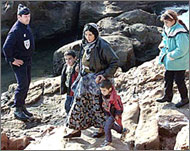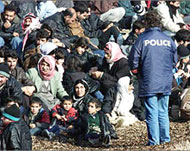The road home
Eight years after a dreaded visit from the Turkish army, the villagers of Mar Bobo are returning home to rebuild their shattered community
The villagers of Mar Bobo still don’t like to think about the day in 1995 when the soldiers drove up the winding, potholed road to their cluster of pink-stoned cottages perched above the plains of south-eastern Turkey.
It was a visit they had been dreading. Eleven years into the bloody uprising of the PKK Kurdish separatists in the region, rumours had reached them that the Turkish army had decided on a draconian new tactic to combat the insurrection.
Convinced that local villages provided support, shelter and succour to the fighters loyal to PKK leader Abdullah Ocalan, the army had begun to apply a scorched earth policy. It would deprive the PKK of its local support network by simply erasing suspected villages from the map.
 |
|
Leaving home: a French policeman |
The army inspection went badly from the start. Tensions were already running high when one member of the patrol scouting the outskirts of the village stepped on an unmarked landmine.
More than a decade of civil war had left many such lethal surprises hidden in the dusty soil of the hills around Mar Bobo, and in the grassy plains that stretch southwards below it towards Syria.
Retribution was swift. As the rank and file soldiers stretchered away their fallen comrade, the officers apparently issued the 150 families of Mar Bobo an ultimatum.
They had two days to leave. Two days to pack their bags and quit a community that had existed in one form or another for 16 centuries.
No one in Mar Bobo took the threat lightly, and the preparations to flee began almost immediately. Some families dug out savings they squirreled away for many years, contacted friends and relatives abroad and made their way towards the Turkish border, hoping to reach Germany or Switzerland.
Most piled their possessions into the backs of beaten up old cars and trucks, and drove the few dozen kilometres to local cities like Nusaybin, Midyat and Mardin.
A few, like Ibrahim Altin, Mar Bobo’s mukhtar – or mayor – just wheeled their belongings down the hill to the neighbouring community of Adabashi, where they found lodging houses that had themselves been abandoned by fearful locals who had fled the civil war.
From Adabashi, Ibrahim and the five other Mar Bobo families who followed him, were able to look up at the hamlet they had left. Just 48 hours after the soldiers had rolled into town, no one remained there.
All around them, the story was the same. The nearby village of Karnak had been emptied too. According to a recent estimation by Turkey’s Human Rights Watch, a further 727 villages in the country’s south east were forcibly vacated by the army during the Kurdish uprising, which lasted 14 years until a ceasefire was agreed in 1999.
The army argued that it gave villagers a choice, offering them the chance to stay if they took up state provided weapons and training and fought the PKK. Some communities did take up the offer, with local men shouldering rifles and becoming
“village guards“.
 |
|
Kurdish refugees off the French |
For the residents of Mar Bobo, however, things were different. They were neither Kurd nor Turk, but one of a dwindling band of Syrian Orthodox communities in the region.
Inside the village churches, praising a Christian God in an offshoot of the Aramaic language Jesus himself is thought to have spoken, the worshippers of Mar Bobo felt themselves caught up in a conflict that did not concern them.
Nonetheless, they paid a heavy price for the fighting. In the last decades the numbers of Syrian Orthodox here have fallen from around 100,000 to a mere 3,000. Many of their villages, and the church spires that marked them out from the usual minarets of the area, now lie in ruins, falling further into disrepair every day.
In Mar Bobo, and hundreds of other similiar villages however, the days of neglect are over. After a campaign that began even as the very first evictions were occurring back in the mid 1990s, the local Turkish authorities have finally granted permission for Kurds and Christians alike to return to the former homes.
Some villages, considered too strategically placed or simply too dilapidated, are not being reoccupied. But in Mar Bobo earlier this month, Ibrahim started rebuilding the home he has been able to see, but not return to, for eight years.
With him he took two Kurdish contractors, who, like builders the world over, whistled through their teeth when they saw the size of the task at hand.
Around the village, roofs have fallen in, and looters have prized away the delicate stone relief work that used to decorate many homes. Thieves have even ripped up the trees that once lined the streets, sawing them up for firewood.
“Once this was a beautiful village with nice people,” said Ibrahim, casting his eyes around the desolation and the graffiti left behind by looters. “It was a very clean place.”
He hopes that his example, and that of several other Mar Bobo families who have also returned to start renovation work, will encourage the scattered remnants of the village to come back and rebuild their community.
“I’m not sure that those who have gone to Germany will come back,” he said. “They’re afraid, and they have everything in their new lives. But you never know. When they see how beautiful we will make Mar Bobo again, they might return.”
He admitted however, that Mar Bobo will not regain its looks overnight.
“The work won’t be quick,” he said, “All the good stonemasons have died.”
The absence of craftsmanship is not the only problem. Money too, is lacking, and the shattered pinkish stones that glow in the evening sun are being replaced by the dusty grey of concrete blocks.
Ibrahim’s wife never saw the sad transformation. When she died two months ago, his relatives in Germany tried to persuade him to escape the misfortunes of his homeland and join them.
“But I said no,” Ibrahim recalls. “I said that if I did leave, the village would be finished. Even when everyone had left, I never gave up on this village.
“Now I am finally coming back. This is the place where I will die. I will be buried here, in the soil of Mar Bobo.”